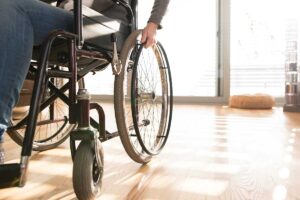Key Takeaways
Severe injuries impact not only physical health but also mental and emotional well-being.
Many victims experience depression, anxiety, PTSD, and grief over lost abilities.
Seeking professional therapy, support groups, and lifestyle adjustments can aid emotional recovery.
Financial stress from medical bills and lost income can intensify emotional struggles.
A strong legal case can help ensure financial stability, allowing you to focus on healing.
Introduction: The Hidden Emotional Impact of Severe Injuries
A life-changing injury doesn’t just affect your body—it affects your mind and emotions in profound ways. Whether you have suffered a spinal cord injury, traumatic brain injury (TBI), severe burns, amputations, or multiple fractures, the emotional toll can be just as challenging as the physical recovery. Feelings of frustration, helplessness, depression, and anxiety are common after a traumatic injury, yet many victims do not receive the emotional support they need.
In addition to the pain and limitations caused by the injury, many victims struggle with:
- Fear of the future and uncertainty about their ability to work or regain independence.
- Grief and loss over physical abilities, careers, or lifestyles that are no longer possible.
- Social isolation due to mobility challenges or self-consciousness about visible injuries.
- Financial stress from mounting medical bills and lost wages.
- Post-traumatic stress disorder (PTSD) if the injury resulted from a traumatic event.
It’s important to understand that you are not alone and that there are strategies to cope with emotional distress. This guide will walk you through how to identify emotional struggles, seek support, and create a path to healing.
Step 1: Understanding the Psychological Effects of a Severe Injury
Severe injuries don’t just cause physical limitations—they also affect mental health and emotional stability.
Common Emotional Reactions to a Severe Injury
- Shock & Denial – Many victims struggle to process the reality of their injury.
- Anger & Frustration – It’s common to feel anger toward others or frustration over limitations.
- Depression & Hopelessness – Losing independence or facing long-term pain can lead to deep sadness or a sense of despair.
- Anxiety & Fear – Worries about financial stability, the ability to work, and future quality of life.
- PTSD & Emotional Trauma – Flashbacks, nightmares, or panic attacks related to the accident.
The Long-Term Impact on Mental Health
- Chronic pain can lead to depression and isolation.
- Loss of employment or financial stability adds stress and uncertainty.
- Strained relationships with family and loved ones due to emotional struggles.
- Reduced self-esteem from changes in physical appearance or abilities.
Step 2: Seeking Emotional Support & Therapy
Emotional healing requires professional support and personal coping strategies.
Professional Mental Health Resources
- Therapists & Counselors – Speaking with a psychologist can help process grief, trauma, and frustration.
- Psychiatrists – If depression or anxiety is severe, medication may be helpful.
- Cognitive Behavioral Therapy (CBT) – A structured therapy that helps manage negative thoughts.
- Trauma Therapy & PTSD Treatment – For victims struggling with flashbacks or emotional distress.
Support Groups & Peer Counseling
- Connecting with others who have faced similar injuries can provide comfort and shared experiences.
- Online and in-person support groups are available for TBI survivors, amputees, and spinal injury victims.
- Family counseling can help loved ones understand how to provide the right support.
The Role of Friends & Family in Recovery
- Emotional validation – It’s important to have people who listen without judgment.
- Physical assistance – Help with daily activities can reduce stress and prevent further injury.
- Encouragement & Motivation – Support from loved ones can prevent isolation and depression.
Step 3: Adapting to a New Way of Life
While a severe injury changes life permanently, adapting to a new reality can help reclaim independence and joy.
Finding New Routines & Hobbies
- Engaging in new activities that accommodate physical limitations can boost mental health.
- Exploring adaptive sports, art therapy, or mindfulness exercises can restore confidence.
- Setting small, achievable goals can create a sense of progress.
Managing Stress & Emotional Setbacks
- Avoid isolating yourself – Stay connected with friends, even virtually.
- Prioritize self-care – Nutrition, sleep, and gentle exercise can improve mood.
- Find a sense of purpose – Volunteering, mentoring, or pursuing education can provide fulfillment.
Financial Stability & Legal Action for Peace of Mind
- Financial stress is a major cause of anxiety after a severe injury.
- Seeking compensation for medical expenses, lost wages, and pain and suffering can provide stability.
- A personal injury attorney can help secure financial compensation, so you can focus on recovery.
Step 4: When to Seek Legal Assistance
The stress of medical bills and lost wages can intensify emotional struggles. If another party was responsible for your injury, seeking compensation can help ease the financial burden.
Who May Be Liable for Your Injury?
- Negligent Drivers – If a car accident caused your injury.
- Employers & Workplaces – If workplace negligence or unsafe conditions contributed.
- Property Owners – If unsafe property conditions caused a slip-and-fall or accident.
- Manufacturers – If a defective product or equipment failure played a role.
How an Attorney Can Help
- File a claim for medical bills, lost wages, and emotional suffering.
- Negotiate with insurance companies to ensure fair compensation.
- Help secure financial resources for therapy, home modifications, and future care.
Conclusion: Healing Takes Time—And You Deserve Support
Coping with the emotional toll of a severe injury is just as important as physical recovery. Depression, anxiety, PTSD, and financial stress can feel overwhelming, but help is available. Seeking mental health support, financial assistance, and legal action can help you rebuild your life.







